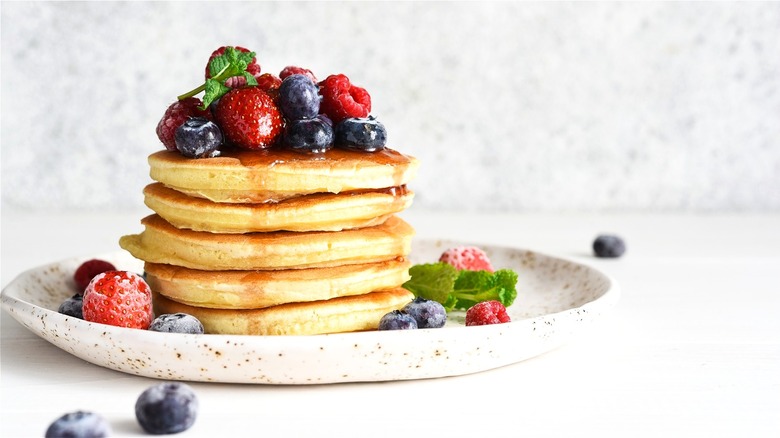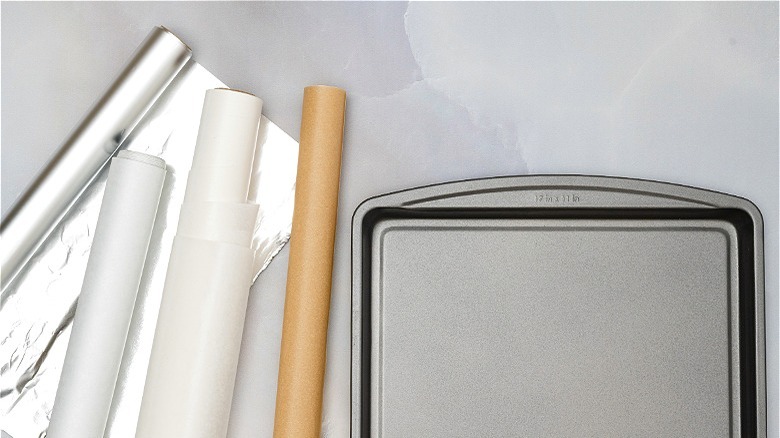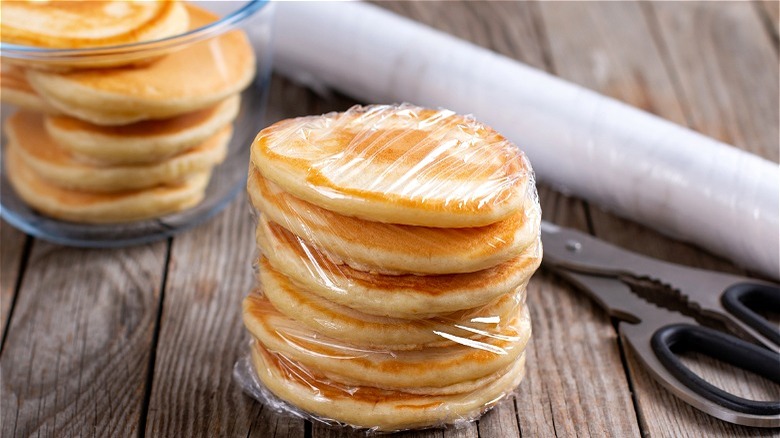The Tip For Keeping Pancakes Warm Until You're Ready To Eat
When the weekend approaches and you have no firm plans besides laying around and watching your favorite television shows, whipping up a fresh batch of buttermilk pancakes is the perfect way to spend your Saturday or Sunday morning.
National Geographic links pancake-making to our prehistoric ancestors based on the discovery of ancient grating tools. But the classic pancake recipe we know and use today follows the somewhat same list of predictable ingredients, as noted in The New York Times Cooking's "everyday pancakes" recipe: flour, butter, sugar, salt, baking powder, eggs, and milk.
Echo Market Research notes how these "everyday pancakes" have become a standard option for the American breakfast table, often enjoyed with the addition of maple syrup and usually eaten during the colder months of the year. According to National Today, 93% of Americans claim to have some level of fondness for pancakes. Because they've amassed quite a large following over the years, having the best pancake recipes tucked up your sleeve is always useful. But if you take the time to labor over a homemade recipe, you may make more than you plan to eat. So, how do you keep your freshly cooked pancakes warm while the remaining batter sits on the griddle?
The oven is the key to warm pancakes
Frying pans have always been a trusted kitchen vehicle for cooking classic pancakes. But the rise of pancake griddles produces more breakfast cakes at a time, given their elongated surface area (per The Pioneer Woman). While one simple search for "pancake griddle" produces more than 3,000 results on Amazon, using a more convenient appliance doesn't completely prevent your first batch of pancakes from getting cold on the counter while the rest cook.
While you could always just pop your pancakes in the microwave for a few seconds to heat them, Martha Stewart suggests keeping your freshly cooked cakes in a low-degree oven until ready to eat. Beyond her suggestions of using quality ingredients and resisting the urge to press down on your pancakes while they cook, Stewart also advises keeping finished pancakes in a 200-degree oven; the low temperature keeps them warm enough without continuing to cook them.
Now that you know the best way to keep your pancakes warm until you're ready to dig in, it's time to consider the best storage options for any leftovers.
Leftover pancakes don't last forever
Whether or not you plan on eating breakfast for dinner, pancakes are always a trusted option due to their versatility. But do they stand as a reliable leftover for future meals? The Pioneer Woman suggests making a large batch of pancakes whenever the mood strikes and freezing a portion for a later date. This not only extends their shelf life to one or two months but also makes for an easy breakfast on more than one occasion.
If you don't have time to freeze your leftover cakes, The Whole Portion says that when stored in an airtight container or resealable bag, pancakes in the refrigerator can last up to three days. However, the life of your leftover pancakes does partly rely on the freshness of the ingredients used.
Three days is not a long time, so if you can remind yourself, stop cooking when you have enough pancakes for that day and save any leftover batter for another morning later in the week. According to Expert Home Tips, depending on the freshness of the milk and eggs used, prepared pancake batter can be stored in the refrigerator for up to four days. Keep all of these tips handy the next time pancakes make an appearance on your weekly menu. Not only can you maximize their shelf life, but you can also reheat pancakes so they taste like they're fresh off the griddle each and every time.


